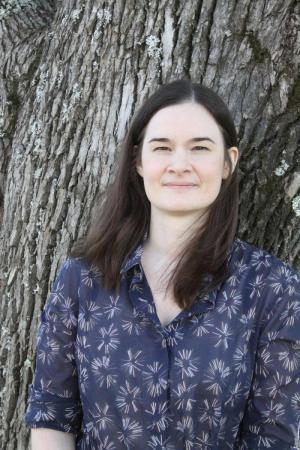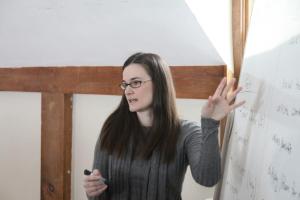Jennifer Girouard Brings It All Back to Marlboro
 “My experience at Marlboro was very intense, in a good way,” says Jennifer Girouard, who graduated in 2001 with a Plan of Concentration exploring the sociology of white-collar labor. A first-generation college student, Jennifer didn’t know what to expect, so she threw herself into the Marlboro experience full steam. “I didn’t actually know what sociology was—they didn’t teach it at my high school, so I had no idea—I just got swept into it,” she says. Now, 15 years later, Jennifer is on the other side of that intense experience, as Marlboro’s new sociology professor.
“My experience at Marlboro was very intense, in a good way,” says Jennifer Girouard, who graduated in 2001 with a Plan of Concentration exploring the sociology of white-collar labor. A first-generation college student, Jennifer didn’t know what to expect, so she threw herself into the Marlboro experience full steam. “I didn’t actually know what sociology was—they didn’t teach it at my high school, so I had no idea—I just got swept into it,” she says. Now, 15 years later, Jennifer is on the other side of that intense experience, as Marlboro’s new sociology professor.
“Sociology is such a broad field,” says Jennifer, reflecting on how she first gravitated toward the discipline. “It was a lens to understand the world in a new way, and to understand my own life trajectory. I think what’s always interesting for students is when they understand some of the large structural forces and start to put together pieces of ‘how did I end up here?’ Seeing that bigger picture is very useful for me. I got sucked into viewing the world through that lens, and I didn’t leave it.”
Jennifer received her doctorate in sociology from Brandeis University, but before continuing on to graduate school she spent five years working with children at a homeless shelter in Massachusetts and for Head Start in Appalachian Ohio. In the latter, she worked one-on-one with preschoolers and their families to build new skills, broaden early development experiences, and monitor their progress.
“Only when I was thinking of coming back to Marlboro did I realize that these meetings were like doing little family tutorials, sitting together and working through what was important to them,” says Jennifer. “These experiences challenged and immersed me in new social and cultural milieu, and honed my sociological lens.”
Jennifer’s doctoral dissertation, titled “When Law Comes to Town: Participation and Discourse in Fair-Share Affordable Housing Hearings,” was based on a study of four towns’ implementation of a state affordable-housing law. She was particularly interested in tracking the discourse of small-scale public hearings where everyone got together and talked—or yelled—about an issue, a forum with interesting similarities to Marlboro’s Town Meetings. Jennifer is co-editor of Varieties of Civic Innovation: Deliberative, Collaborative, Network, and Narrative Approaches.
Jennifer says that many of the things that drew her in as a Marlboro student continue to inspire her as a professor. She started teaching in the fall already aware that Marlboro’s professors are constantly being challenged and pushed to new subjects by students, to a degree rarely found at other institutions.

“When a student comes to me with an interest, I get to expand and learn alongside them. Having been a student, I understood that this was part of the job, and that’s what excited me to come back. I’m currently working with a student on immigration in Sweden. I don’t know anything about that, but now I get to learn it, and it benefits me, the student, and other students that come after.”
With a discipline as broad-ranging as sociology—essentially the study of the social world—Jennifer expects many fascinating diversions driven by student interest. She’s also eager to provide opportunities for students to participate in her ongoing research, exploring competing structures and cultural discourse through local land-use conflicts.
“I’m always interested in how we construct and contest space and land use, and I’m sure there are a lot of really interesting ways to build on that here,” Jennifer says. “I’m very interested in how we view and regulate different housing types, such as trailer parks, which here in Vermont were the hardest hit by Tropical Storm Irene.”
Jennifer recognizes that she is rejoining Marlboro at a really interesting transitional time period. There’s a lot of new energy coming in with students, and there’s a shift in faculty—with concomitant discussions of changes in the curriculum. She is excited to see what comes of these conversations, but thinks there are some core things that won’t change.
“Marlboro does so well at preparing students to think richly, deeply about the world. I was just telling Jerry [Levy, sociology professor emeritus] that when I started my doctoral program without a master’s degree, I felt completely prepared. Marlboro doesn’t prepare students for specific jobs or different career paths, but it shapes their minds in ways that are very effective, if hard to measure.”
